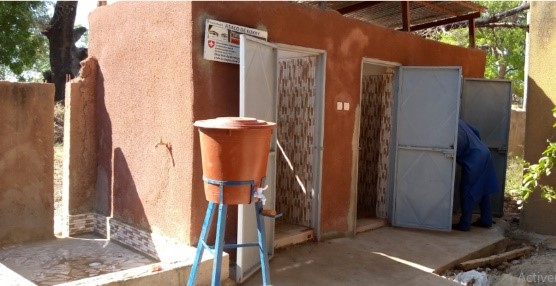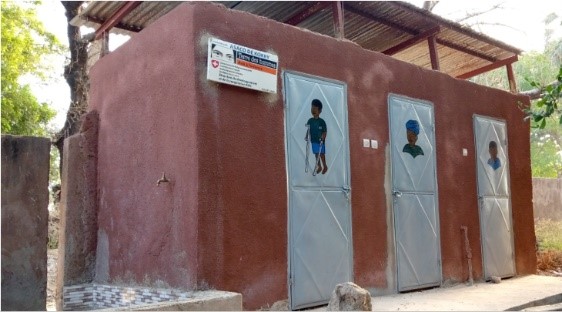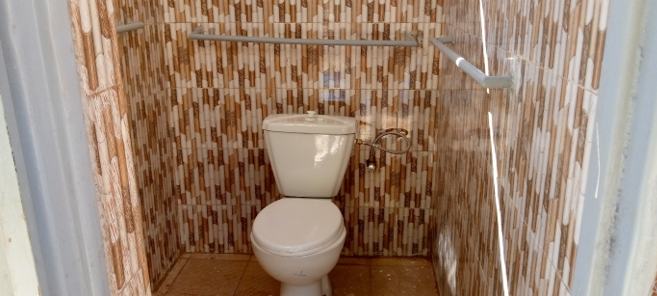18. November 2020
written by Aboubacar Ballo – Terre des hommes
Note: The original story is available in French here.
WASH FIT is a participatory and continuous approach to introduce water, sanitation and hygiene improvements in health care facilities. Terre des hommes has piloted the approach in four health care facilities in Mali between 2018 and 2019 and is now integrating these lessons learned into the project activities of phase three of the Swiss Water and Sanitation Consortium. Aboubacar Ballo, WASH expert at Terre des hommes in Mali, has put together a case study on the experiences and learnings from piloting WASH FIT in the districts of Macina and Markala.
Context
In the area of Segou in Mali, the lack of access to water, hygiene and sanitation in health care facilities (HCF) is particularly acute. An evaluation conducted in 2018 found that none of the 21 assessed health care facilities offered basic sanitation services in accordance with the standards of the Joint Monitoring Program developed by WHO, UNICEF and the Malian Ministry of Health.
For a sanitation facility in a health care center to comply with the sanitation standards of the Joint Monitoring Program the following criteria must be met:
- Provide improved toilets within the health care facility;
- Provide separated functioning toilets for staff, for women as well as for disabled persons with menstrual hygiene facilities.
The actual situation in the health care facilities presented a completely different pictures when Terre des hommes started its work in the districts of Macina and Markala. Open defecation was a common practice within some health care facilities.
Terre des hommes gained experience from working in 35 health care facilities in the framework of the second phase of the Swiss Water and Sanitation Consortium. These experiences were used for a WASH FIT pilot phase between 2018 and 2019 in 4 health care facilities in Macina and Markala districts. The WASH FIT approach is a participatory method for the continuous improvement of access to basic water, hygiene and sanitation. One of the pilot centers was the community health center of Kokry, which had a sanitation facility with improved but not functioning toilets resulting in bad sanitation practices.
With the support from Terre des hommes, the community health center of Kokry implemented the WASH FIT approach. The sanitation component received particular focus in Kokry, given that it represented the biggest challenge for the health center.
Strategy and Approach
During Mali’s decentralization process, public water, sanitation and health services have been transferred to local authorities. Thus, the local authorities have the administrative authority; however, they have transferred the management responsibilities for public water, sanitation and health services to community health associations. Community health associations are voluntary groups comprised by villagers of a neighborhood or a village and ensure the functioning of a community health care center. For the project these associations represent a key partner for planning and implementation.
In the piloting phase, Terre des hommes started with awareness raising campaigns in the target districts of Markala and Macina. Communities were sensitized to the risks associated with lacking water, hygiene and sanitation services at the health care facilities and learned about the advantages and opportunities of the WASH FIT approach. WASH FIT is a practical and participatory tool aiming to improve water, hygiene and sanitation services of health care facilities– for staff, patients and visitors. WASH FIT also helps health care facilities to be prepared to face epidemics such as COVID-19 or climate-induced disasters.
Key Steps in the Project Implementation
1. Active Engagement in Mali’s WASH FIT Community
Terre des hommes has invested time and resources to establish a network within the local WASH community and became an active member of the ‘WASH in Health Care Task Force’ co-led by WHO and the Ministry of Health.
2. Facilitation of an Inter-District Learning Visit on WASH FIT
Thanks to the established network, Terre des hommes has been able to initiate inter-project learning exchanges with projects led by WaterAid, WHO and the Ministry of Health. One exchange was organized jointly with the regional health and sanitation directors in July 2018 between the WASH FIT pilot districts Macina and Marka. The learning visit enabled health personnel, technical directors, the public officials and the community health associations to get a better understanding of the WASH Fit methodology. The peers actively exchanged on advantages, challenges and the contextual factors to be taken into account for the replication of best practices.
3. The Implementation of the WASH FIT Approach
The WASH FIT approach was implemented step-by-step according to the following order:
- Establishing the WASH Fit team: This team was composed of the community health associations, health personnel, community leaders, youth and women’s associations, the mayor’s office, and other interested parties.
- Conducting an initial assessment of the WASH conditions in the community health centers;
- Identifying and prioritizing measures and actions for improvement;
- Developing and implementing a progressive improvement plan;
- continuously monitoring the effectiveness of the plan and revising it periodically.
During the practical phase of the WASH FIT training, a session was conducted on the consequences of open defecation around health centers. A simulation (inspired by the WASH approach “Assainissement Total Piloté par la Communauté”) was carried out in order to create disgust and motivate the WASH FIT committee to abandon unsafe sanitation practices.
4. Community Mobilization for Improved Toilets
In the community health center of Kokry, a community mobilization campaign was initiated with the support of the village religious leader. The campaign was able to raise funds and to collect construction materials (concrete and reinforcing iron) from village merchants, which were used to start the local construction work on the toilet block of three latrines. Terre des hommes technically supported the construction work and made sure that the infrastructure met the technical requirements of the Ministry of Health. These requirements included an access ramp for people with reduced mobility as well as installations for menstrual health management. The Regional Departments of Health and Sanitation strongly welcomed the initiative and participated in the official inauguration of the facilities.
5. Strengthening Community Capacities for Safe Management and Dispoal of Excreta
Prior to the project implementation, the community health center of Kokry was not safely disposing excreta, even though the health center is located in a flood-prone area. Terre des hommes, in collaboration with the local department for sanitation and pollution as well as the regional sanitation director, raised awareness among the community health associations and the health personnel about the interlinkages between sanitation, health, environmental pollution as well as climate change. They were also informed about the correct use of the double pit latrine as well as the toilet maintenance protocol. The community health association decided to contract a local business for the regular emptying of the single pit latrines.
Results
The main results that have been achieved by November 2020 are as follows:
- Thanks to the hard work of the community, the Kokry community health center offers safely managed basic sanitation facilities consisting of three latrines that include access to electricity and water supply. The latrines are visibly separated for gender and people with disabilities and accommodate menstrual hygiene needs.
- The community health association has introduced sustainable measures for the safe management of excreta.
- The community health association has earmarked a budget line for the improvement of WASH services in health care facilities.
Success Factors
- Peer Exchanges Through Learning Visits
The facilitation of the peer learning visit by Terre des hommes between the districts of Macina and Markala allowed the community health associations to learn from concrete experiences in the other regions, in particular with regard to community mobilization.
“If all health care facilities in the area drew inspiration from the health care center of Kokry, WASH problems in the health care centers would be soon solved. This demonstrates the success of the community health associations and the effectiveness of the new WASH FIT approach. The strong position of the community health association is an unusual and new situation because the associations generally have limited resources and can generally only cover the costs related to maintenance and consumables.”
Danséni Synayogo, Chief Medical Officer of the Health District of Macina
- Influential and Motivated Community Members as Part of Community Health Associations
The selection of influential and motivated people as leaders and members of the community health association has helped build trust and solidarity in the service of the community health centers. This was the key to mobilizing local resources for the realization of the improved sanitation facilities. Since 2019, the community health associations have made sanitation one of the priorities in their budgeting.
“We have seen that the community health association is on the right track and has decided to take its destiny into its own hands. This is why the local authorities decided to support the community health association in their work and offered to cover the plumbing costs for the installation of the toilet seats in the sanitation cabins. A plumber from Ségou, 130 km away, was recruited.”
Zoumana Diassana, Mayor of Kokry
Recommendations
The main challenges that have been encountered in project implementation are the following:
- The construction of the latrine took longer than expected because of the strong increase in the price of sanitary equipment and inputs related to logistical constraints and the health emergency measures put in place by the government due to COVID-19.
- Initially, the community health association used local masons without involving the governmental technical services. As a result, the toilets did not meet the minimum WASH standards defined by the Ministry of Health and the WASH in Health Care Task Force. Particularly bothersome was the fact that the constructed pit lacking the technical standards was constructed in a flood-prone area and was thus at risk of being damaged during rainy season. With the technical support of Terre des hommes, the pit was well fortified and plastered on the inside to ensure safe waste disposal.
- The WASH FIT approach should be included and integrated in municipal planning. This strengthens the commitment of the communal councils in the financing of WASH activities in the health care facilities.
Going to Scale
The experiences from the Kokry health center and the three other health care facilities where the WASH FIT approach was piloted will be used for phase three of the Swiss Water and Sanitation Consortium. In phase three, Terre des hommes continues to support the four health care facilities of the piloting phase and extends its outreach to six additional health care facilities, supporting in total ten health care facilities in three districts in Mali.
Terre des hommes will continue to facilitate inter-district learning from the experience to create favorable conditions for replication. Lessons learned from the experience can be used by other consortium members as part of the inter-project learning process.
References
WHO / UNICEF. 2018. Water and sanitation for health facility improvement tool (WASH FIT): A practical guide for improving quality of care through water, sanitation and hygiene in health care facilities.


